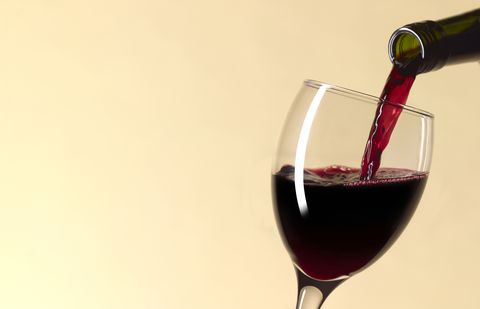What actually happens when you pass out from alcohol?
‘Tis the season to eat mince pies, order some seriously last-minute presents and, ahem, overindulge in plenty of bucks fizz and mulled wine. Right?
It’s no secret that the run-up to Christmas can be a particularly boozy time of year. And, despite ongoing coronavirus restrictions, this year is no different on that front. Stats show that people are drinking more in recent months, with Brits consuming 1.3 billion litres of alcohol during the UK’s lockdown period.
So, whether your alcohol tolerance has just gone down this year as you’ve been out less (actually a thing) or you’re just one of those people who loves a boozy Bailey’s hot choc come Christmas time, we thought we’d pick the experts brains about what actually happens when you blackout from alcohol. You know: when you accidentally take it one-wine-too-far and wake up with no recollection of even getting into bed in the first place.
It goes without saying that consuming enough alcohol to black out or pass out is absolutely not advisable. We ask the experts to explain exactly why.
So, why do we pass out from alcohol?
You know the drill – a glass of prosecco, then you crack open the white, next thing you know you’re sipping red. But… you don’t remember the bottles being switched over…
Did you know? Passing out after a night of drinking is actually a minor yet very common symptom of alcohol poisoning, according to nutritionist Lauren Windas. “You blackout when your blood alcohol levels are high”, she explains. Which, more often than not, can’t cause long-lasting harm, but can sometimes be very dangerous, she warns.
Nutritionist Jenna Hope agrees, sharing that when you pass out from alcohol, you normally lose consciousness, too. “Blacking out or losing memory occurs when blood alcohol content rises to around 0.14 to 0.19%,” she explains. Although do note here, there will be slight variations between individuals.
The rate of:
- drinking
- choice of alcohol
- hydration
- body fat percentage
- muscle mass
- genetics
can all impact blood alcohol content, which in turn will decide whether or not you blackout. But how?
“When blood alcohol content rises the hippocampus – the area of the brain which is responsible for memory formation – is impaired”, Jenna explains. “Therefore, an individual’s ability to create new memories is compromised,” she explains.

How interesting. Ever woken up with a groggy head and wondered what on earth happened to your evening? Yep, you guessed it right: your blood alcohol content had impaired your memory formation. “Consequently, individuals may wake up the following day with no recollection of the events which occurred during intoxication,” she explains.
Are there different types of blackout?
There are indeed: partial and complete, according to Windas.
“A partial blackout is where visual or verbal cues may help you remember forgotten events from the night you drank. A complete blackout, on the other hand, is where the memory loss is permanent – that is, you’re unlikely to remember what happened,” she explains.
What else happens when you blackout?
Well, aside from you likely having a stonker of a hangover the next day, you’ll be depleted in key nutrients such as B-vitamins and vitamin C, and micronutrients such as magnesium, zinc, and calcium. “Ensuring a nutrient-rich diet the following day is key to improving nutrient status following alcohol consumption,” Jenna shares. Think a balanced breakfast meal including protein, fats, and carbs: avo on toast with eggs of choice being a good example.

Plus, be very mindful of how drinking too much can impair you mentally and physically. “The more alcohol you consume, the more adenosine will build up in the body,” Windas explains. FYI, adenosine is a neurotransmitter that makes you feel tired and can contribute to your passing out.
What’s the best way to avoid blacking out?
In short, be careful with how much you drink, be mindful of the alcohol you’re consuming, and be sensible enough to take on water throughout your evening, too. Scroll our expert-led tips for the handy tricks that could keep you from passing out post-the next Zoom party…
6 tips for someone who blacks out regularly
1. Try abstaining from alcohol
That is, have a glass here and there or even give up alcohol altogether, if you think it’d suit your lifestyle more. There are a myriad of positives to cutting out booze, including potential weight loss, clearer skin, and improved mood. Read up on 21 celebs who’ve proudly gone sober.
2. Focus on moderation
If you don’t want to give it up altogether, that’s also fine, too. It’s about improving your relationship with alcohol so you’re not regularly experiencing harmful blackouts. Drinking less generally and focusing on being mindful of what you’re consuming is key here. The NHS recommendation is 14 units a week.
3. Respect your pace
Don’t feel pressured to keep up with others if you’re more comfortable drinking more slowly. A glass of water in between each alcoholic drink will also do you the world of good.
4. Eat before consuming any alcohol
Lining your stomach is a thing and an important one at that.
5. Avoid drinking games
As fun as they are, they can lead to you consuming far more alcohol than you realize. “Shots can contribute to a much higher total alcohol intake,” Windas explains.
6. Avoid binge drinking
This is defined as consuming more than four drinks in two hours, FYI.



